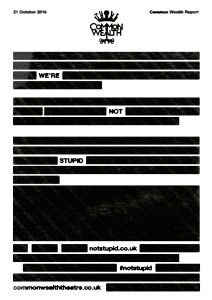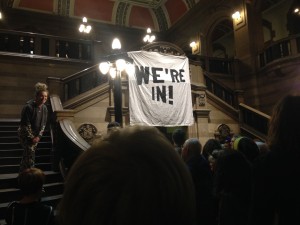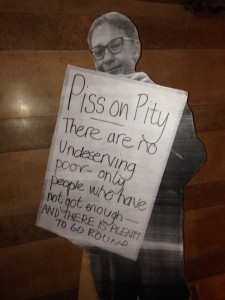The Deal Versus The People
Post by Jenny Hughes
Common Wealth Theatre
Council Chambers – Bradford City Hall, 21 – 24 October 2015
“I’m really glad you’re all here, thank you, from the bottom of my heart, for coming. I wanted witnesses. I need you to see this and then go away and tell people – this feels like the only way I’m going to get noticed – they can’t ignore this, can they?”
These are the first lines of a new performance from award-winning theatre company, Common Wealth, which premiered last week in the Council Chambers at Bradford City Hall, The Deal Versus The People. The speech is an impassioned appeal from a young man in Bradford – ‘just a normal guy’ – for collective political action in response to the growing gap between the rich and poor and extraordinary pressures on communities created by austerity. Without giving too much away (the piece may tour next year), the opening is startling, especially when played out against the backdrop of the opulent council chambers. Semi-circle rows of ornate chairs and desks with microphones and translation screens face two tiers of even more ornate chairs positioned above the rest, with the impressive and all-surveying mayoral chair the focal point. The young man stands on a large polished table in the centre of the room, interrupting the mayorial sight-line – angry, directly addressing the audience, speaking in an urgent and emotional register – promising to commit an outrageous act to get attention and ‘be the person who started to change things’. The audience is immediately off balance. ‘You thought, they wouldn’t really do that in a play would they?’ said an audience member afterwards. As we waited for the show to begin in the foyer, a banner was unfurled over the stairwell by two activists in balaclavas that read – ‘we’re in’. The place for elected representatives and calm, considered debate was temporarily occupied by ‘the people’ – the voters, as well as by those without the heart to vote for politicians who do not appear to represent them or understand their lives.
The Deal Versus The People is a play about a trade deal – the Transatlantic Trade and Investment Partnership (TTIP). The play came about in response to a direct invitation from Ruth Bergan (Trade Justice Movement) to Common Wealth to create a piece of theatre responding to TTIP. TTIP is a controversial trade deal currently being negotiated between the EU and US – it promises to establish the largest free trade area globally, and there are serious concerns about how the deal may create a ‘race to the bottom’ as regards food and production standards, with concomitant negative effects on the well-being of communities and workers rights on both sides of the Atlantic (see references below for information on TTIP). With funding from Arts Council England and Bradford City Council, and additional support from UNISON and West Yorkshire Playhouse, auditions for the show took place in community centres across Bradford in summer 2015. The audition flyer stated ‘No acting experience necessary, we are looking for people who are not normally represented in politics, have never performed professionally before and are of all backgrounds and ages … we are particularly interested in people who have experiences of unemployment, all languages welcome’ and a core cast of four performers and a larger community cast were appointed. Following a trip to London to speak with TTIP experts from the UK government, War on Want and Friends of the Earth, there was a four week devising and rehearsal process, with the script developed by the cast, working closely with playwright Aisha Zia from Common Wealth and Daniel Bye. The cast drew on their own experiences of living in Bradford to create a response to TTIP – Bradford is a city negatively affected by the neoliberal economic policies that TTIP threatens to further enhance and enshrine, with high levels of unemployment and poverty. As Ruth Bergan from the Trade Justice Movement commented in her blog about the pilot project (which too place at Toynbee Hall last year), ‘this kind of economic disruption is most likely to hit the least-well-off communities hardest, yet they have had no say in the development of the deal let alone the content of the negotiations’.
Common Wealth make theatre that responds to imaginative combinations of sites, people and experiences. Here, the site is a debating chamber in a city with a history intimately related to the ebbs and flows of free trade (for a short account of this history see ‘Bradford shaking’ – a piece of writing I did for the digital accompaniment to the show. Thid website – notstupid.co.uk – was developed by digital designer Matt Wright, from Slurp Design). In previous shows, Common Wealth combinations have included empty houses on social housing estates (for Our Glass House – exploring domestic violence) and young Muslim women in boxing gyms (No Guts, No Heart, No Glory). The company like working with people who have not performed in a professional theatre context before, and their performances provide a platform for voices and experiences all too rarely represented on stage with any richness or complexity. I was pleased to be invited to reflect on the process with the company – and am in the middle of conversations with cast, partners and artists, to be written up over the next few months. The rest of this blog post is about the performance itself.
The Deal Versus The People had an extraordinary energy, created by its materialisation and celebration of the dynamism of a social movement. This was present during the process as much as the performance – ‘when I go to rehearsals I don’t feel like I’m going to work’, said one actor, ‘I feel like I’m participating in a movement’. The performance staged a protest from the moment of its inception and – watching rehearsals and performances – this energy meant that I was repeatedly reminded that a play is a living, social thing. An obvious point perhaps, but one that is too often unrealised in the theatre. As a performance it seemed to breath with its audience – the startling opening created an intake of breath, and the exhale at the end of the speech set in place a regular beat that varied in pace, with quiet moments of intense reflection followed by scenes of explication, noise and anarchic exuberance. The crescendo of voices in the finale created a call and refrain that moved around the space, making the chambers vibrate. Here, some phrases were spoken by single voices, some by groups, words came from actors in the walkways between the seats, from the community cast members sitting in the chamber proper, from the raised platform. The phrases were sometimes one-off and sometimes repeated, sometimes answered by the whole group, sometimes proclaimed by single voices, and sometimes by clusters of voices – ‘it’s not just us’; ‘it’s all around the world’; ‘there are more people than there are governments’; ‘there are more people than there are corporations’. The echoes of this call and refrain took a proliferating physical form as the audience left the council chamber – on our way out to the square we met a series of cardboard life-size cutouts of Bradfordians, sending beautiful messages to people in power …
You can view more messages via the ‘people’ section of notstupid.org.uk – click here
Watching the performance, I became slightly obsessed with tracking these breaths, echoes, rhythms and refrains. There were many – the anarchic destruction promised by the opening speech emerges again in a quieter scene a few breaths later, where we meet a woman creating a recipe from the contents of a food bank parcel – ‘a meal of last resorts’. And then again later, fizzing with a more celebratory energy as a noisy occupation is staged. The character motifs of mothers and sons reappeared throughout, focusing our attention on a relation of care – the pressures placed on this relationship in times of austerity provided an important emotional fulcrum for the play. The standing man on the table at the start becomes a figure of frustration and creativity that dances around, over and on top of the table midway through the performance. The plea to pay attention, to listen, to respond, carries its echo throughout as the cast experimented to find the right mode of political expression. A theme of silence and noise resonated through the text and performance – ‘there are a lot of silent messages in our communities, telling us that we don’t matter’ – and extended into an aural landscape created by a music and sound score from composer Wojtek Rusin. The rhythms were also reflected in a scene that traced the rise and fall of the city itself, supported by an ingenuous design by Michelle Wren. Here, a pop-up cardboard Bradford appeared and demonstrated Bradford’s wealthy history, transformed by closures of workplaces, buildings, facilities – ‘the free market closes more than it opens. That’s what we’ve seen in Bradford’. This pop-up Bradford was a parody of a model you might see at a town planning meeting – with the full throttle embrace of free market capitalism, social planning becomes a quaint and out-of-date notion.
The play responds to the closing down of debate that can seem a feature of the formal political public sphere – something that is also sensed in the space of the council chambers. As director Evie Manning said early in the process – ‘you walk in there and start talking in whispers – you feel hushed – we are going to make a piece that creates a lot of noise’. An odd feeling in a space carefully designed to facilitate debate, perhaps, but this is also an incredibly hierarchical space that reveals the contradictions of representative democracy. The mayoral seat is on high, and the laypeople’s chairs hidden away at the back or in galleries above – excluded from the visual and vocal scenario created by the architecture. The Deal Versus The People is far from a theatre of debate – it is rather an explosive performance of feelings and frustrations generated by the corrosiveness of austerity. That is, of experiences that cannot be so easily put into words, and that the dry, all-too-easy rationalising register of deal-making dismisses, sublimates and excludes. The oral registers of deal-making seems designed, in the words of an audience member ‘to keep you out of it – they want you to be too tired to engage’. The Deal Versus The People insists on a new communicative fulcrum, one founded on an appreciation and care for the social, the intimate – ‘I’m a. Living. Thing. Not a. Deal to be made’ – reminding the deal-makers of the incalculable energy of bodies in movement, and the immeasurable effects of deals made in ignorance of these presences.
Further reading
The Guardian article by Stuart Jeffries, ‘What is TTIP and why should we be angry about it?’ is a good place to start if you are new to the TTIP debate
For more resources, go to War on Want’s page on TTIP
Ferdi De Ville and Gabriel Siles-Brugge’s new book TTIP (Polity Press, 2016) is an excellent and accessible read
For an excellent introduction to Common Wealth, with some great insights on The Deal Versus The People from director Evie Manning, see Alice Saville’s article in Exeunt
For a report by Ruth Bergan (Trade Justice Movement) on the pilot performance project (including the full script) click here




Comments are closed
Sorry, but you cannot leave a comment for this post.